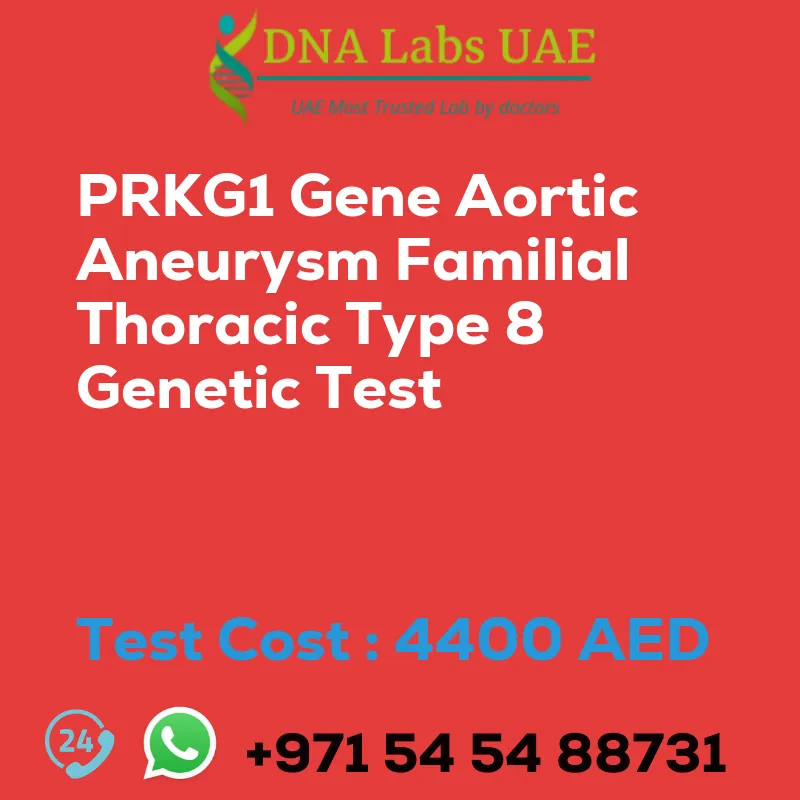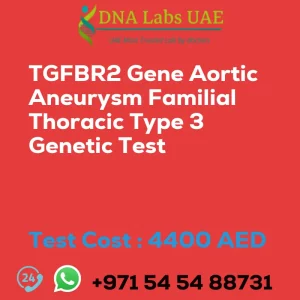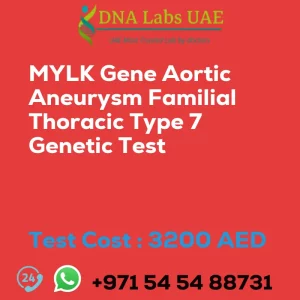PRKG1 Gene Aortic Aneurysm Familial Thoracic Type 8 Genetic Test
Test Name: PRKG1 Gene Aortic Aneurysm Familial Thoracic Type 8 Genetic Test
Components: Blood or Extracted DNA or One drop Blood on FTA Card
Price: 4400.0 AED
Report Delivery: 3 to 4 Weeks
Method: NGS Technology
Test Type: Vascular Diseases
Doctor: General Physician
Test Department: Genetics
Pre Test Information: Clinical History of Patient who is going for PRKG1 Gene Aortic Aneurysm, Familial Thoracic Type 8 NGS Genetic DNA Test. A Genetic Counselling session to draw a pedigree chart of family members affected with PRKG1 Gene Aortic Aneurysm, Familial Thoracic Type 8 NGS Genetic DNA Test gene PRKG1
Test Details
The PRKG1 gene is associated with aortic aneurysm, familial thoracic type 8. This condition is characterized by the weakening and dilation of the aorta, the main blood vessel that carries blood from the heart to the rest of the body. Aortic aneurysms can be life-threatening if they rupture.
NGS (Next-Generation Sequencing) genetic testing is a type of genetic test that analyzes multiple genes simultaneously. It can provide a comprehensive analysis of a person’s genetic makeup and identify any variations or mutations in the PRKG1 gene that may be associated with familial thoracic aortic aneurysm type 8.
By identifying these genetic variations, NGS genetic testing can help diagnose individuals with familial thoracic aortic aneurysm type 8, even before symptoms appear. It can also help determine the risk of developing an aortic aneurysm in family members who may carry the same genetic mutation.
Genetic testing can be useful for individuals with a family history of aortic aneurysms, as it can provide valuable information for making informed medical decisions. It may also be recommended for individuals who have been diagnosed with an aortic aneurysm, as it can help guide treatment options and surveillance plans.
It is important to note that genetic testing should be done under the guidance of a healthcare professional or genetic counselor who can provide appropriate counseling and interpretation of the results. They can help individuals understand the implications of the test results and provide recommendations for managing their condition.
| Test Name | PRKG1 Gene Aortic aneurysm familial thoracic type 8 Genetic Test |
|---|---|
| Components | |
| Price | 4400.0 AED |
| Sample Condition | Blood or Extracted DNA or One drop Blood on FTA Card |
| Report Delivery | 3 to 4 Weeks |
| Method | NGS Technology |
| Test type | Vascular Diseases |
| Doctor | General Physician |
| Test Department: | Genetics |
| Pre Test Information | Clinical History of Patient who is going for PRKG1 Gene Aortic aneurysm, familial thoracic type 8 NGS Genetic DNA Test. A Genetic Counselling session to draw a pedigree chart of family members affected with PRKG1 Gene Aortic aneurysm, familial thoracic type 8 NGS Genetic DNA Test gene PRKG1 |
| Test Details |
The PRKG1 gene is associated with aortic aneurysm, familial thoracic type 8. This condition is characterized by the weakening and dilation of the aorta, the main blood vessel that carries blood from the heart to the rest of the body. Aortic aneurysms can be life-threatening if they rupture. NGS (Next-Generation Sequencing) genetic testing is a type of genetic test that analyzes multiple genes simultaneously. It can provide a comprehensive analysis of a person’s genetic makeup and identify any variations or mutations in the PRKG1 gene that may be associated with familial thoracic aortic aneurysm type 8. By identifying these genetic variations, NGS genetic testing can help diagnose individuals with familial thoracic aortic aneurysm type 8, even before symptoms appear. It can also help determine the risk of developing an aortic aneurysm in family members who may carry the same genetic mutation. Genetic testing can be useful for individuals with a family history of aortic aneurysms, as it can provide valuable information for making informed medical decisions. It may also be recommended for individuals who have been diagnosed with an aortic aneurysm, as it can help guide treatment options and surveillance plans. It is important to note that genetic testing should be done under the guidance of a healthcare professional or genetic counselor who can provide appropriate counseling and interpretation of the results. They can help individuals understand the implications of the test results and provide recommendations for managing their condition. |








